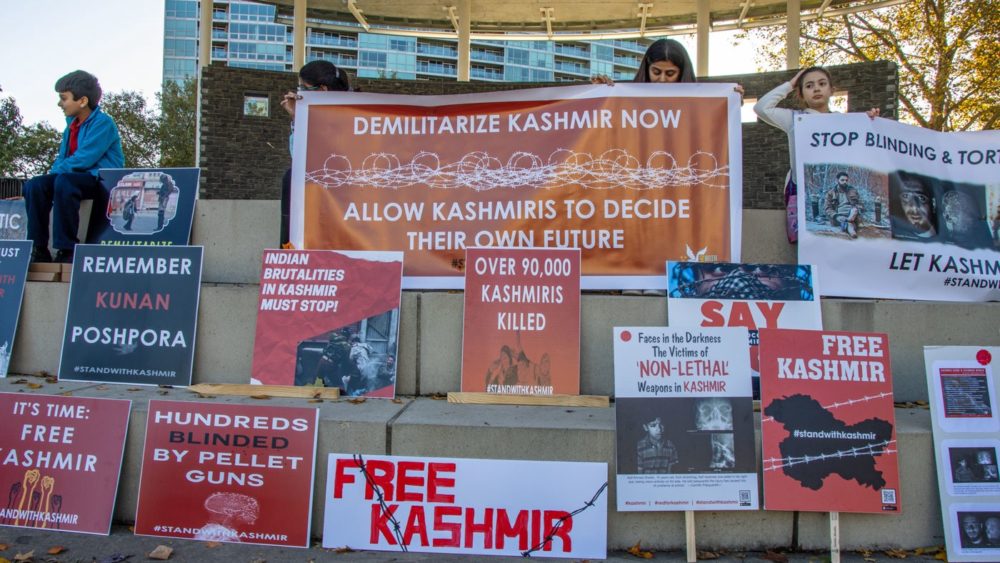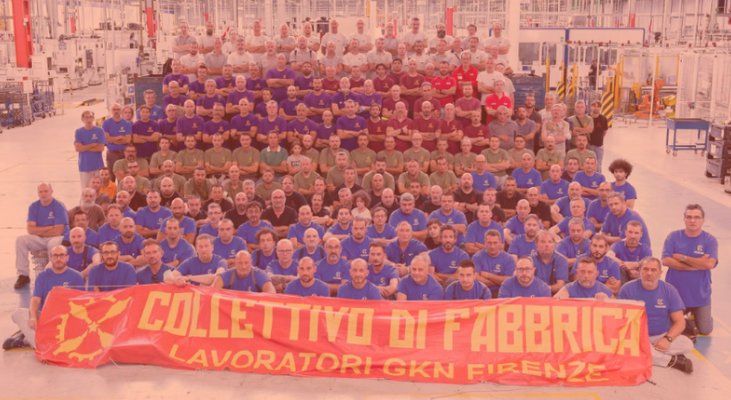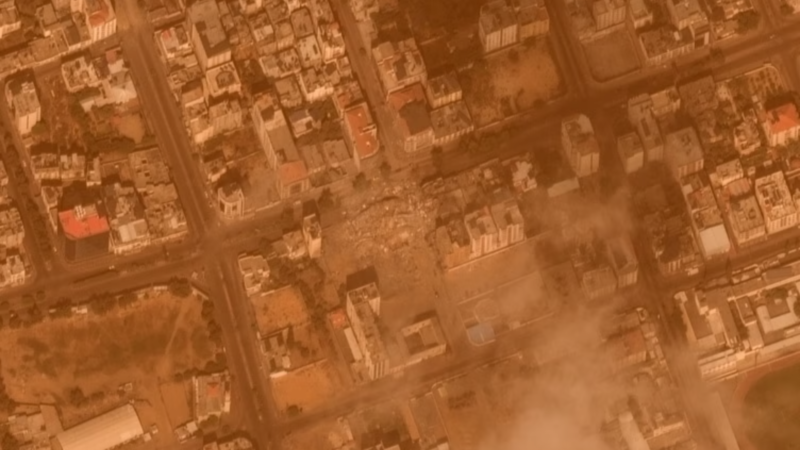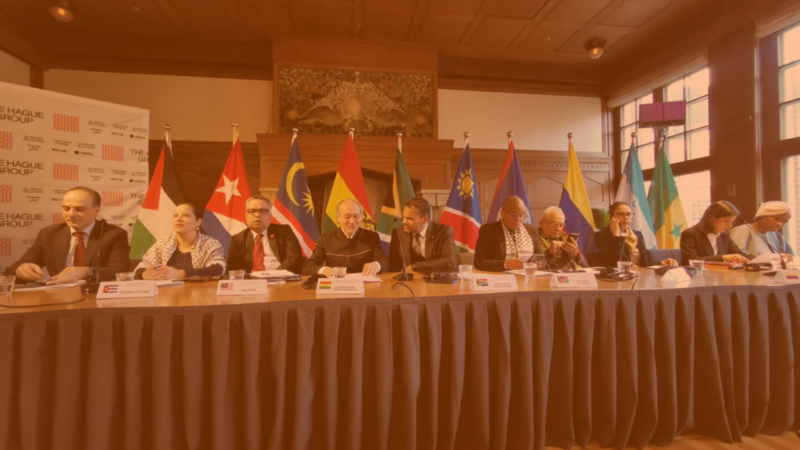The final status of Kashmir is a shadow that has hung over India and Pakistan since the partition of British India in 1947.
Indeed, it has been the main reason for hostilities between the two nuclear armed states over the years.
Despite the various United Nations (UN) resolutions and bilateral agreements, India has now incorporated Indian Administered Kashmir (IaK) into the Indian State in a way that effectively removes any route to self determination. To make matters worse, the international community has stayed largely silent on unfolding events bowing to pressure if they do.
We should not, and must not, allow ourselves or our political leaders to shy away from calling out abuses as and when we see them.
Kashmir: a brief summary.
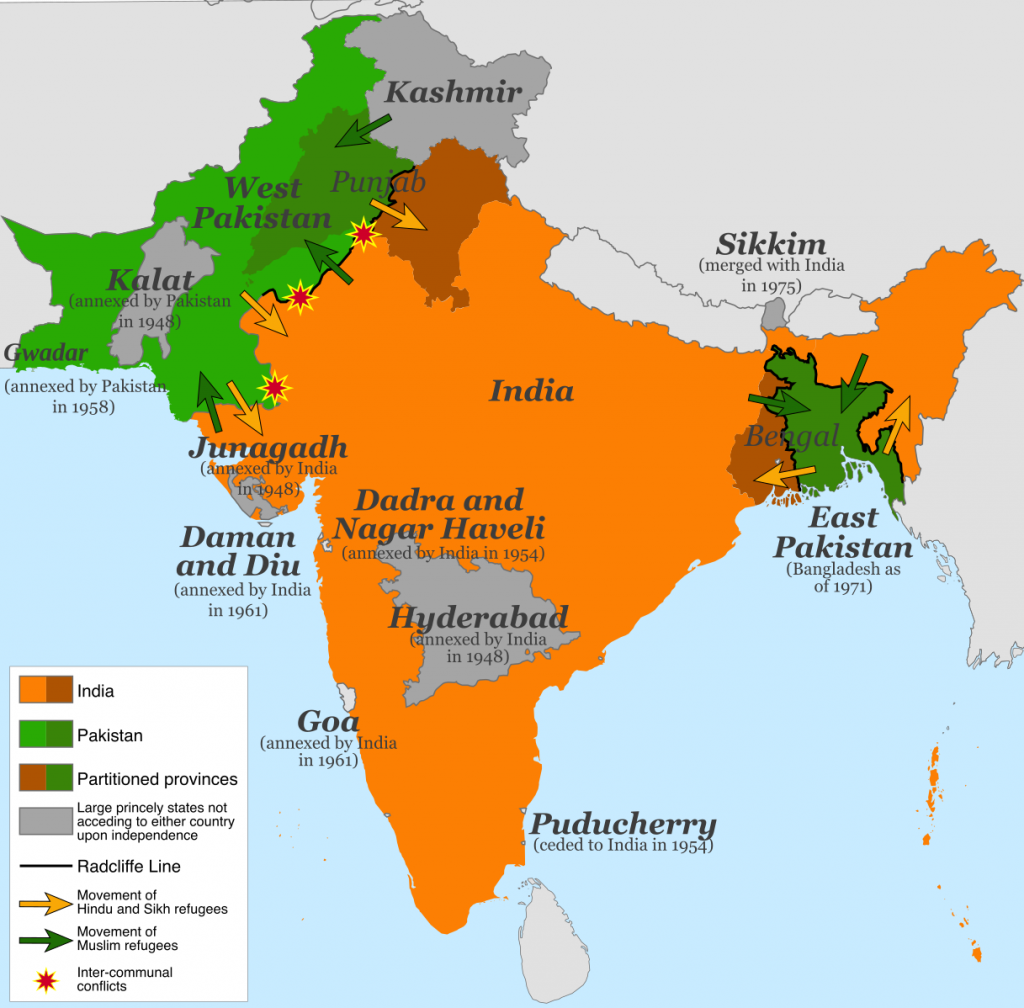
Map of the partition of India (1947) | Credit: Wikimedia — CC BY-SA 4.0
Under the planned Partition of British India, Kashmir was advised to join either of the newly formed states. However, Maharaja Hari Singh of Jammu and Kashmir preferred to remain independent.
However, in October 1947, Pakistan backed tribesmen launched attacks with a view to taking over Kashmir. Fearing this attack, the Maharaja asked the Indian government to come to Kashmir’s defence.
By January 5th 1949, both sides agreed to a UN brokered ceasefire, and fighting died down. Kashmir was now a divided area with India controlling two-thirds, and Pakistan the remaining third. They agreed to allow Kashmir as a whole to vote on its future; they just didn’t specify when. The Indian government gave special status to Kashmir and Jammu people by adopting Article 370 of the Indian Constitution. This gave the Kashmir people a high level of autonomy, with only foreign affairs, defence and communications left in the hands of the government in Delhi.
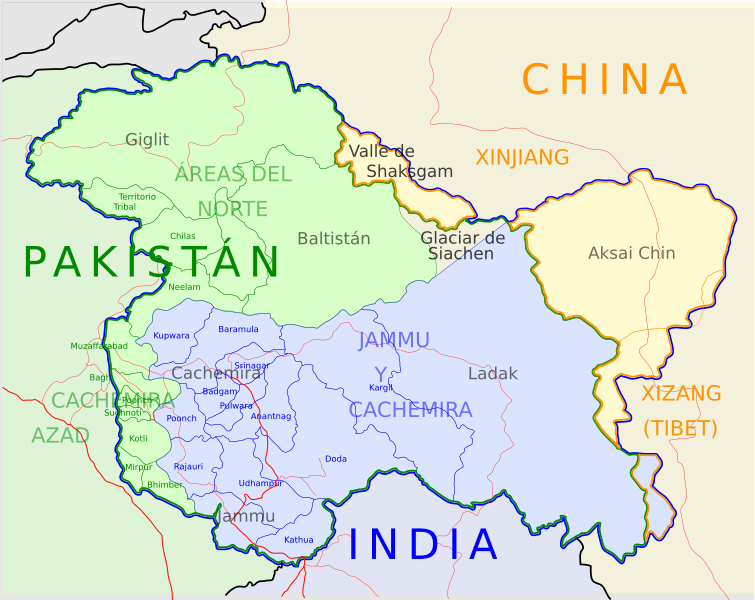
A Map Showing A Divided Kashmir
The issue of Kashmir, like Palestine, has become a sound bite issue. That is, world leaders mention the cause in speeches to appear interested, but seldom have real proposals to help.
India slides into post-democracy unchallenged.
The BJP led government of Narendra Modi has been accused of creating a culture of fear amongst Indian Muslims for many years now. The Prime Minister, who is popular with world leaders, has refined how he does this so as to keep his hands clean.
Modi harnesses the power of the Indian media and celebrities to push his nationalist rhetoric.
A U.S. government watchdog group on international religious freedom gave India its harshest rating since 2004, saying the government of PM Narendra Modi has allowed “campaigns of harassment and violence” against Muslims and other religious minorities.
In present day Kashmir, signs of trouble started in the first few days of August 2019 when India moved tens of thousands troops into Kashmir, closed schools and colleges, tourists were ordered to leave and telephone and internet services were cut off.
The Modi government then stunned the international community by revoking nearly all of Article 370, leaving Kashmiris with no protections.
There had been a growing level of violence towards Muslims in India as a whole, and this decision left Kashmiris fearing for their lives. Initially little was known as India banned access to the United Nations, any foreign journalists and a communication blackout was kept in place.
Meanwhile, across India Hindu Nationalists celebrated Kashmir’s loss of status and the international community said, well very little actually. The United States under Donald Trump stated that Kashmir is an internal Indian matter and the British government went with; “we are watching closely.” All in all, the people of Kashmir were largely abandoned by the outside world.
As time progressed, reports of human rights violations began to circulate and footage on social media would show Indian Forces clashing with protesters in Kashmir, sometimes using lethal force.
Numerous journalists have been detained under a new law in which an individual can be designated a terrorist and sentenced to jail for up to 7 years. Simply reporting facts can end up with imprisonment, although as with Julian Assange, we know that those in power do not like being shown to be criminals.
How India deals with international detractors.
In late September 2019, The UK Labour Party’s Annual Conference took place in Brighton in the South of England. While Brexit would take up the main thrust of the gathering, a motion regarding Kashmir was put forward too.
The motion, which was overwhelmingly supported by Labour members stated that:
“There is a humanitarian crisis in the disputed territory and the people of Kashmir should be given the right of self-determination. It also called for international monitors to be allowed into the region.”
Almost immediately, the motion was described as “anti Indian” by supporters of Indian Prime Minister Narendra Modi.
The Labour party chairman, Ian Lavery, bowed to pressure and rolled back support for the people of Kashmir. Lavery apologised for the offence the motion had caused.
This month, the new Labour leader Sir Keir Starmer reiterated this stance and went even further. He signaled that he would increase trade. Once again showing that capitalism trumps human rights in the neo-liberal world.
What is DiEM25 doing?
The movement’s Thematic DSC on Peace and International Policy met and drafted a statement for DiEM25 to adopt. DiEM members can see the draft that our Coordinating Collective (CC) will make a decision on how to proceed very soon, by clicking here.
For those who are not members, here is an excerpt of the proposal put forward:
“Why has Europe for over 20 years turned a blind eye to Indian atrocities, and been reluctant to condemn the BJP government of exhibiting the kind of bigotry and intolerance that Europe sooner points out in its “official” enemies?
“The reason for this, we believe, is Modi’s embrace of the global financial institutions’ consensus, the massive implementation of austerity which relegated India to a subordinate position in the world economy and hegemony”
If you’d like to learn more, consider joining us and helping us grow a pan-European alliance that can take on the elite oligarchs who are intent on crushing the working class.
Do you want to be informed of DiEM25's actions? Sign up here





